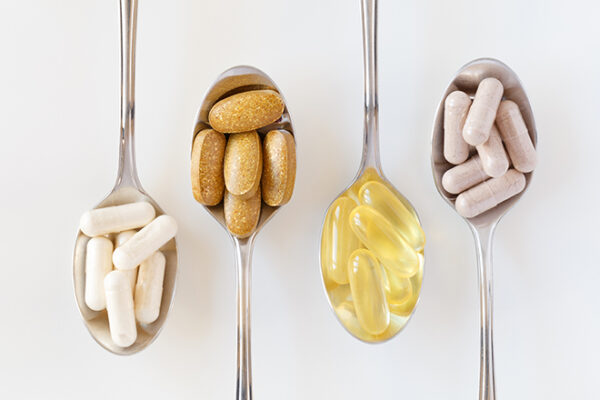Myths about Supplements – we’ve all heard of them, but what do we really know about these little pills and powders? Are they safe? Do they actually work? As someone with over two decades of experience in the supplement industry, I’m here to tell you that there are a lot of myths surrounding supplements that need to be debunked.
But before we get into the nitty-gritty, let me give you a little background on myself. I started working at a health food and supplement store when I was just 17 years old, and by the time I turned 18, I was the manager of the Vitamin and Supplement Department. I spent 4 years as a Vitamin Manager before becoming Assistant Store Manager. For the following 15 years, I ran my own business focusing on health and nutrition, where I frequently addressed client questions about supplements. Let’s dive in and set the record straight on myths about supplements.,
Myth #1: All supplements are natural and, therefore, healthy.
Fact: Not all supplements are healthy or natural. The supplement industry is not regulated like pharmaceuticals or other over-the-counter drugs. Regulators classify supplements as foods. That is why it is super important to purchase and consume supplements from reputable companies like Bump Vitamins. Bump Vitamins uses practitioner-grade ingredients made by GMP and UL manufacturers, meaning they adhere to FDA rules and have been third-party tested for label accuracy. However, some supplements may contain unlisted ingredients, potentially causing harmful effects like liver damage.
In 2017, a team of scientists and doctors from Einstein’s Healthcare network in Philadelphia reviewed and tested 203 different supplement products and found that only 44% of the products tested contained what the label indicated. Those are scary numbers!
Bodybuilding, weight loss, and energy supplements are often mislabeled. Around 20% of drug-induced liver damage is linked to misuse or mislabeling of these products. Always read labels carefully and choose supplements with GMP, UL, and USP logos for safety. This is why it’s very important to read the labels, understand what you are taking, and look for supplements that carry the GMP, UL, and USP logos.
Myth #2: You cannot overdose on supplements
Fact: One of the biggest myths about supplements is that you can’t overdose on supplements. Supplements, if not taken correctly, can lead to an overdose. It’s crucial to consult a healthcare professional about your supplement routine to avoid excess intake of certain vitamins like A, E, D, and K, which are fat-soluble and can build up toxic levels in your body. Some herbal remedies can also be dangerous if consumed in high quantities.
Traditionally, Chinese medicine uses Ephedra sinica for respiratory health, but overdose cases, some fatal, have led to its removal from American shelves. Sudafed and other sinus medications use ephedrine, the active ingredient in Ephedra. However, its misuse as a stimulant and weight loss aid led to misinformation, improper use, and, eventually, its ban. Similar risks exist with many other herbs and supplements if used incorrectly.
Myth #3: There are no drug interactions with supplements because they are natural.
Fact: Did you know that drug interactions can happen between natural supplements and prescription medications? This is not limited to just supplements; drug interactions can also occur between multiple prescription medications or even when taking medicine with certain fruit juices. That’s why it’s crucial to inform your healthcare professional about all the supplements and prescriptions you are using.
Sharing this information with your pharmacist or healthcare provider can help prevent potentially dangerous interactions. It’s worth noting that natural supplements, food, and prescription medications all contain chemicals, and these chemicals can react with one another. This doesn’t mean you can’t take natural supplements if you’re on prescription medication, but it does emphasize the need for caution and consultation with your pharmacist or healthcare provider.
Myth #4: No one should take supplements.
Fact: Another big myth about supplements is that all supplements are bad, and every person can get enough minerals and vitamins from our diet. However, this is untrue. While it is true that not everyone needs supplements, some people do. For instance, nearly all obstetricians recommend that women take prenatal vitamins when pregnant. We do this to achieve proper nutrition and prevent birth defects.
Due to soil degradation and inadequate consumption of fruits and vegetables, many people don’t meet the recommended daily intake of essential vitamins and minerals. It’s crucial to monitor any side effects from supplements and occasionally pause their use to allow your body to process and utilize these substances. It’s particularly advisable to use herbs for short-term periods, as they can quickly impact the liver, an organ essential for metabolizing nutrients and excreting unwanted substances. Bump Vitamins provides a pause feature on all subscription bundles, allowing you to manage supplement add-ons as per your healthcare provider’s advice.
Myth #5: The common consumer should not use any supplements due to their potential safety risks.
Fact: There are many supplements that are safe and can be helpful for those who need a natural way to enhance or supplement their health. Using high-quality products in the correct quantities and for the right reasons can make supplements important for maintaining health. As a consumer, it’s your responsibility to research and choose the right supplement company. Evaluate what supplements you need and always keep your healthcare provider in the loop about your choices.
Conclusion
Throughout the years, people have asked me many questions about supplements, and these are the most common myths I have encountered. If you have any specific questions, please don’t hesitate to contact us through our website’s contact page. We’re here to provide answers and assistance. The key takeaway is to always inform your healthcare provider about the supplements you’re taking or planning to take. Consider trying Bump Vitamins for a free health assessment and personalized supplement routine. With Bump Vitamins, you can easily start, pause, or modify your routine through your online account. Rest assured, we offer high-quality supplements you can trust.




